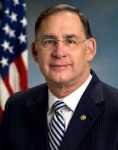- Supporting Americans with Disabilities and Their Families (3/6/25)
- Standing Up for Sportsmenís Access and Safety (2/20/25)
- Bringing Farm Country Voices to Washington (2/12/25)
- A New Front in the Fight Against Prostate Cancer (2/6/25)
- Taking Action to Reverse Immigration Failures and Protect Communities (1/30/25)
- Setting the Agenda for 2025 (1/22/25)
- Making progress for Arkansasís water infrastructure (1/16/25)
Confronting the Coronavirus
Americans are understandably on edge as more cases of the novel coronavirus disease (COVID-19) appear in the U.S. and the death toll continues to rise around the globe. My colleagues and I understand this anxiety and have come together to step up efforts to prevent the spread of the disease, treat those infected and support research to find a vaccine.
It remains unknown how life-threating COVID-19 is on a case-to-case basis. Symptoms tend to mimic those of other well-known respiratory illnesses like the flu. According to the World Health Organization (WHO), most individuals with mild symptoms have recovered quickly, which has also made identifying cases of COVID-19 a challenge. This, in turn, has exacerbated the spread of the disease and increased risk worldwide.
The rapidly escalating death toll in other countries has led to fears of fatalities on a similar scale in America. I believe our robust public health sector puts us in a good position to stop that from happening.
The Senate Appropriations Committee, on which I serve, has worked closely with other members of Congress and the administration to ensure the federal government has ample resources to address a public health crisis of this magnitude. In recent years, we have increased funding for the Centers for Disease Control (CDC), the National Institutes of Health (NIH) and other key government agencies charged with overseeing public health. These agencies are charged with working collaboratively with public health officials and health care professionals at the state and local level to take a government-wide approach to mitigate the spread of COVID-19.
The CDC began tracking the coronavirus from its onset in Wuhan, China, working with our partners in the international community to identify and isolate this new virus that caused the outbreak. Now that Americans have been diagnosed with COVID-19 within our borders, we must take the proper steps to detect possible cases and provide medical care to individuals with this diagnosis, as well as ensure that transmissions of the disease do not reach epidemic proportions here.
The Trump administration has taken proactive measures to counter the spread by restricting travel from nations with widespread, ongoing transmission of COVID-19. The president has appointed a task force, headed by Vice President Mike Pence, to coordinate intergovernmental response and mitigation efforts. The task force is also working with pharmaceutical companies to accelerate the development of a COVID-19 vaccine. I appreciate the leadership of the president and his administration, and I expect they will continue to work with Congress as we respond to this situation.
The emergency funding legislation Congress has passed and the president has signed into law will provide a surge in funding at every level—local, state and federa—to confront this challenge head-on. It allocates $7.767 billion in discretionary emergency funding—more than triple the administration’s original request—to address the COVID-19 crisis.
Nearly 85 percent of this funding will be spent on domestic programs, ensuring that the focus remains on protecting Americans here at home, while still providing ample funding to fight the spread of COVID-19 abroad. Arkansas’s public health agencies are set to receive at least $6.2 million in funding as a result of this bill.
This is a robust response, which is the right approach to take when facing a crisis of this scale. We can’t afford to fall short in this effort.
An informed public is one of the best weapons in this fight. Along with avoiding traveling to areas where exposure risks are high, the CDC has issued commonsense recommendations for everyday preventive actions to help mitigate the spread of COVID-19. You can visit my website at Boozman.senate.gov or resources provided by the CDC to learn more.
Posting a comment requires free registration:
- If you already have an account, follow this link to login
- Otherwise, follow this link to register

